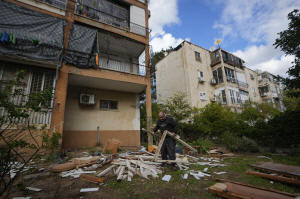Israel struggles to deter escalating attacks from Yemen's Houthi rebels
as other fronts calm
 Send a link to a friend
Send a link to a friend
 [January 03, 2025]
By TIA GOLDENBERG [January 03, 2025]
By TIA GOLDENBERG
TEL AVIV, Israel (AP) — The rockets from Gaza have mostly fallen silent.
A ceasefire with Hezbollah militants in Lebanon has taken hold. But
repeated fire from Yemen’s Houthi rebels, a faraway foe, is proving a
stubborn threat for Israel.
The Iran-backed Houthis are stepping up their missile attacks, sending
hundreds of thousands of Israelis scrambling for shelter in the middle
of the night, scaring away foreign airlines and keeping up what could be
the last major front in the Middle East wars.
“It's like musical chairs,” said Yoni Yovel, 31, who left the northern
Israeli city of Haifa late last year to avoid rocket fire from Hezbollah
only to see his apartment in Tel Aviv’s Jaffa neighborhood heavily
damaged by a Houthi missile.
Israel has repeatedly bombarded ports, oil infrastructure and the
airport in the Houthi-held capital Sanaa, some 2,000 kilometers (1,200
miles) away. Israeli leaders have threatened to kill central Houthi
figures and have tried to galvanize the world against the threat.
But the Houthis persist. In recent weeks, missiles and drones from Yemen
have struck nearly every day, including early Friday morning, setting
off air raid sirens in broad swaths of Israel. In some cases, the
projectiles have penetrated Israel’s sophisticated aerial defense
system, most recently toppling an empty school and shattering the
windows of apartments near an empty playground where one missile landed.

Because most missiles are intercepted and because the fire is usually a
single missile at a time, the strikes have not caused major physical
damage, although a few attacks have been fatal during the 15-month war
in Gaza as the Houthis attack in solidarity with Hamas.
But the rocket fire is posing a threat to Israel’s economy, keeping many
foreign airlines away and preventing the country from jump-starting its
hard-hit tourism industry.
Houthi attacks on shipping in the Red Sea have all but shuttered an
Israeli port in the city of Eilat and have prompted ships destined for
it to take a longer, more costly route around Africa to Israel's
Mediterranean ports.
The Houthi strikes are also a symbolic reminder for Israel of the
Iran-backed enemies that encircle it, known as the “Axis of Resistance,”
and the last major holdout. And because Israel’s counterstrikes have yet
to deter the Houthis, their persistent attacks defy Israel’s image as a
regional military powerhouse.
“They are the only ones who are active now,” said Danny Citrinowicz, a
research fellow at the Institute for National Security Studies, a Tel
Aviv think tank.
The Houthis, he said, “are a challenge of a different kind.”
Shortly after Hamas launched its attack on Israel on Oct. 7, 2023, the
Houthis began striking Israel-linked ships in the strategic Bab
el-Mandeb Strait along Yemen’s coast. Those attacks expanded to include
other ships with no ties to Israel, disrupting cargo and energy
shipments that are critical for worldwide trade. The Houthis said it was
part of their campaign aimed at pressuring Israel and the West over the
war in Gaza.
In response, U.S. and partner forces have launched multiple rounds of
coordinated airstrikes against Houthi launch sites and weapons storage
sites.
Throughout the war, the Houthis have also been firing missiles and
drones at Israel, at first focusing on Eilat and eventually broadening
attacks to include major population centers and the seaside metropolis
of Tel Aviv. The launches have intensified in recent weeks.
[to top of second column]
|

A man works next to damaged building near the site where a missile
launched from Yemen landed Jaffa district, in Tel Aviv, Israel,
Tuesday, Dec. 31, 2024. (AP Photo/Matias Delacroix)

“There was thunder the other night and my daughter thought it was a
missile. She woke up and started screaming,” said Ibrahim Sosa, 53,
whose home in Jaffa is near the site of a recent missile landing.
Israel has retaliated repeatedly and vowed to escalate if the
attacks don't stop.
“We will hunt down all of the Houthis' leaders and we will strike
them just as we have done in other places," said Defense Minister
Israel Katz, shortly after Israeli jets struck Yemen last week.
The Israeli strikes have been deadly, with several people killed.
Israeli military spokesman Rear Adm. Daniel Hagari told The
Associated Press that Israel’s strikes focused on “military
infrastructure which was used and directly contributed to Houthi
terror activities, including to smuggle arms and finance their
terror activities."
Hagari acknowledged the battle would be complex. And despite massive
Israeli air power, the Houthis have continued their assaults. That
stands in contrast to Hamas, Hezbollah and Iran — three other
enemies Israel has largely neutralized over the past 15 months.
“Israel has many years of familiarity with those enemies. There is
intelligence and there is the important element of a ground
maneuver, and in Yemen we can't do that. The scale here is
different,” said Eyal Pinko, a former Israeli defense official and
senior research fellow at the Begin-Sadat Center for Strategic
Studies, an Israeli think tank.
Yemen does not border Israel, and Israel cannot easily stage a
ground invasion as it has in Gaza and Lebanon to dismantle enemies’
infrastructure. Israel has to orchestrate complex air missions to
fly to Yemen, which are costly and limited in what they can achieve.
Pinko also said the Houthis have learned over years of fighting
against a Saudi-led coalition how to bounce back from airstrikes.

While the Houthis have been active as an insurgent force for years,
Israel hasn’t seen them as a priority or invested as much in
gathering intelligence against them.
Against Hamas, yearslong intelligence helped target and erode the
group's forces. With Hezbollah, Israel penetrated deep into the
organization, allowing it to unleash an offensive last year that
detonated the pagers of rank-and-file members and decimated its
senior ranks in secret bunkers. In Iran, Israel struck Hamas’ top
leader in an apartment in Tehran and knocked out many of its air
defenses in an October strike that left parts of the capital
exposed.
But the Houthis' hideouts, weapons and infrastructure are less known
to Israel, making its counterstrikes somewhat less effective. Hagari
recognized that Israel’s intelligence in Yemen was “an issue” and
said the military was working to improve.
Until then, some in Israel are steeling themselves for a war of
attrition with the distant enemy.
“There's no quick fix,” Citrinowicz said. “Even if the war in Gaza
ends, this is a threat that will not disappear.”
All contents © copyright 2024 Associated Press. All rights reserved |